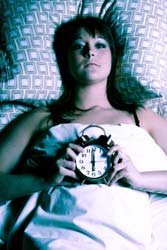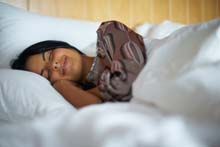Hidden Insomnia Health Risks:
How to Sleep Better, Starting Tonight!
by www.SixWise.com
Insomnia, the most common sleep complaint among Americans, means “no sleep” in Latin. And as the definition implies, people with insomnia may not only have trouble falling asleep or staying asleep, they may also not feel refreshed or restored upon waking.
|

Chronic insomnia can lead to mental health problems including anxiety disorders and depression.
|
It’s an extremely common problem, with up to 40 percent of Americans suffering symptoms of insomnia within a given year, and 10-15 percent dealing with chronic insomnia, according to the National Center for Sleep Disorders Research at the National Institutes of Health.
The chronic lack of sleep associated with insomnia does more than just zap your energy, however. It can cause serious health conditions and even interfere with your quality of life.
Insomnia Health Risks That Might Surprise You
A good night's sleep is necessary for physical and mental well-being. Don't get enough of it and you risk the immediately obvious impacts of being irritable and having trouble concentrating and making decisions. Don't get enough of it over time and you risk even more serious consequences including:
-
An increased risk of diabetes
-
Accelerated aging
-
An increased risk of cancer
-
An increased risk of psychiatric problems, including depression and anxiety disorder
-
Poor immune system function
-
Increased risk of heart disease and high blood pressure
-
Overweight and obesity
-
Lower performance on the job or at school
In fact, in time insomnia can impact just about every facet of your physical and mental health.
“Left untreated, insomnia is linked to increased illness or morbidity. There is a wealth of research indicating that people with insomnia have poorer overall health, more work absenteeism, and a higher incidence of depression,” writes the National Sleep Foundation (NSF).
Lack of sleep clearly does not come without a price. Sleep deprivation and disorders are estimated to cost over $100 billion each year in lost productivity, sick leave, medical expenses, and damages to property and the environment, according to NSF.
Also at stake is your driving ability. Sleep deprivation is involved in 100,000 vehicle accidents -- and 1,500 related deaths -- every year.
The Major Causes of Insomnia
About half of people who suffer from insomnia blame it on stress and worry, according to NSF, making it the top cause of this sleep problem. Stress, of course, can stem from any number of situations (school or work anxiety, relationship difficulties, a chronic illness in the family, etc.).
Other common causes include alcohol and caffeine, both of which can interfere with your dreams of quality sleep, particularly if you drink them in the afternoon or evening.
If you wake up and go to sleep at drastically different times each day (students are infamous for this), you could also be inadvertently throwing off your body's natural sleep/wake cycle. When it comes to sleeping, your body prefers a set schedule.
Others at risk are the 17 percent of U.S. employees who are shift workers. This schedule forces you to stay awake during the night when your body thinks it should be asleep (then makes it difficult to sleep during the day, when you would normally be.
If you are not healthy physically, it can drastically interfere with your sleep as well. Common culprits are pain (from arthritis, back pain, etc.), sleep apnea, restless leg syndrome, PMS and menopause. The hormonal changes that occur during pregnancy can also cause sleep problems.
Certain medications, including antidepressants, heart and blood pressure medications, allergy medications, stimulants, corticosteroids, decongestants and weight-loss products, can also interfere with sleep.
Similarly, a mattress that's uncomfortable, a room that's too hot or bright, a bed that's too small, or kids and pets that barge in during the night can all keep you up at night.
How to Beat Insomnia and Get Some Much-Needed Sleep: 11 Top Tips
Getting a good night’s sleep is not a luxury; it’s a necessity. Fortunately, if you’re having difficulty sleeping, you don’t have to simply ignore the problem and hope it goes away. There are simple changes you can make to your lifestyle that may help you get your much-needed shuteye, and we’ve compiled 11 of them here:
- Exercise, ideally everyday. This positive stress will tire out your body in a good way -- just be sure not to exercise too close to bedtime (within three hours), as it could keep you up.
Exercise really does work remarkably well, according to one study by researchers at Federal University of Sao Paulo in Brazil. Study participants who engaged in moderate exercise had increases in both total sleep time and sleep efficiency. After moderate aerobic exercise, participants also reported a significant reduction in the anxiety state that interfered with quality sleep!
As part of your routine, we recommend you get a “mind-body” workout too, which has benefits for both your physical and mental sides, by trying out a one-of-a-kind program that is used by numerous fitness buffs and professional athletes … a mind-body fitness program that takes the best components of Pilates, Yoga, Tai Chi, Martial Arts, Gyro-Kinesis, Dance and MORE -- guiding you through unique sequences of movements that strengthen, sculpt, build core and increase flexibility!
Shea Vaughn’s exclusive program is offered by MySheaNetics.com. It was founded by fitness expert Shea Vaughn, who has blended ancient and contemporary movements with eastern philosophy, creating a stylized approach to fitness designed to improve the quality of today’s western living. Along with the physical benefits of exercise, this program can help calm your mind, which is conducive for restful sleep.
-
Drink a cup of relaxing tea, like chamomile.
-
Stretch a bit before you lie down. You can literally stretch out some of the "kinks" and tension of the day.
|
Sleep Easy With the Ultimate Soothing Music and Meditation CD on the Market!

With 0guided sleep meditations by a leading meditation expert, Mary Maddux, and music by a renowned meditation music composer with 20 years experience, this CD will help you fall asleep fast, and find deep rest ... at an incredible price.
Sleep Easy CD users have reported:
-
Falling asleep faster
-
Waking up less throughout the night
-
Falling back to sleep faster when awakened during the night
-
Feeling more rested the next morning
Some Recent Testimonials
"I was surprised by how quickly I drifted off to sleep ... The music is phenomenal, ethereal. Mary's voice has a musical, relaxing and trance-inducing quality. There was a difference, also, in the quality of my sleep. Upon awakening, I felt more rested." --SR, Mother, CA
"I fell asleep more easily with the CD--not sleeping with all this stuff on my mind and all the unfinished business of the day. The music is relaxing, calming, nurturing ... " --Kitty Alder, Energy Consultant, NE
For a Limited Time: Get FREE Shipping Anywhere in the World!
|
-
Wear earplugs or an eye mask. If you can hear noisy traffic or see lights from outside, earplugs and an eye mask can give you the silence and the darkness that are ideal for sleep.
-
Create a relaxing bedtime routine. Take a bath before bed, brush your teeth, get into your PJs and turn on some soothing music that will let your mind know it's time for slumber.
-
Once you are in bed, listen to a relaxation CD with guided meditations like the Sleep Easy CD to help you "shift gears" and relax into sleep. Meditation is an effective treatment for insomnia, and one recent study from Northwestern Memorial Hospital in Evanston, Ill. found patients who meditated had improvements in sleep latency, total sleep time, total wake time, wake after sleep onset, sleep efficiency, sleep quality and depression.
-
Don't drink caffeinated or alcoholic beverages near your bedtime.
-
Keep to a regular schedule that includes a set time to go to sleep and wake up.
-
Make your room "sleepable." A very dark, cool room is best for sleep. You may also want to consider getting a new mattress. About 87 percent of people who purchase a new mattress say they are satisfied with their choice and its impact on their quality of sleep, the Better Sleep Council reports. Generally, a mattress' life span is five to seven years.
-
Get a handle on your stress. It is the number-one cause of sleep problems, according to sleep experts. Meditation, exercise, yoga, prayer, journaling, deep breathing and healthy eating can all help you keep your stress levels under control.
-
Put the kibosh on work before bed. If you work or do other mentally trying activities too close to bedtime, you may have a hard time relaxing for sleep.
Recommended Reading
Sleep Apnea: The Silent Killer That Can Raise Your Death Risk 46 Percent
Napping … Is it Good for You? Should You do It?
Sources
National Sleep Foundation
ScienceDaily.com June 15, 2009
ScienceDaily.com June 12, 2008
ScienceDaily.com July 6, 2007
MayoClinic.com Insomnia